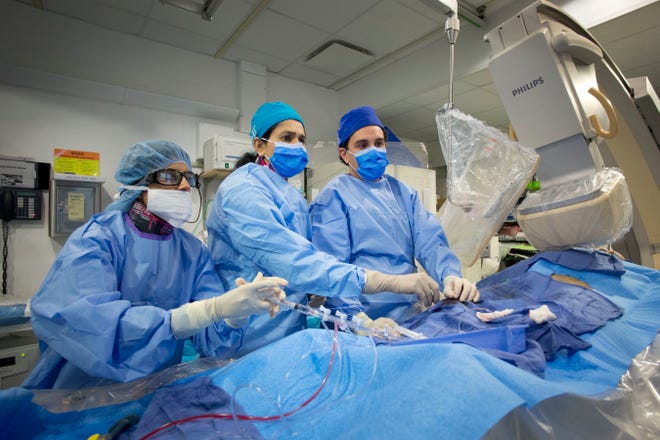Common heart procedures such as stents and bypass surgery don’t prevent heart attacks or deaths more often than cholesterol-lowering drugs and lifestyle changes for millions of Americans with stable heart disease, a new federally funded study shows.
Cardiologists often use invasive measures such as inserting stents to open clogged arteries or bypass operations to reroute blood around a blocked artery. But findings from the ISCHEMIA study, unveiled Saturday at the American Heart Association’s annual meeting, found these procedures do not prevent heart attacks or deaths more effectively than medication and lifestyle changes.
However, the National Heart, Lung, and Blood Institute-sponsored study reported people who experience frequent angina, or chest pain, had more relief after stents or bypass surgery compared to medicine and lifestyle changes alone.
The largest-of-its-kind study provides compelling evidence for cardiologists to adopt a conservative approach in taking care of millions of Americans with moderate heart disease, says Daniel Muñoz, a Vanderbilt University Medical Center cardiologist.
“This study will help us make sure the right patient gets the right treatment,” Munoz said. “For this subgroup of patients with stable disease and stable symptoms, this study powerfully suggests we ought to have a conversation with the patient and really try to do the most we can with medication.”
Study:Young women now more vulnerable to heart disease, cardiac woes
For your health:7 healthy habits that can protect you from heart attack and stroke
The question of whether aggressive treatment is more effective than cholesterol-lowering medications alone has been controversial in cardiology circles. A 2007 study found stents or bypass operations were no more effective than medication and lifestyle changes in preventing heart attacks or deaths, but the study was criticized over how it was was designed and conducted.
Any changes in medical practice would affect a sizable population. The American Heart Association estimates 17 million people have stable heart disease, 9.4 million with chest pain.
But the ISCHEMIA study of 5,179 high-risk patients in 37 countries found no difference in the death rates among people who received stents or bypass operations compared to medication and lifestyle changes.
“The all-cause rates of death were the same,” said Judith Hochman, who chaired the study and is a senior associate dean for clinical sciences at the New York University Grossman School of Medicine. “We saw no difference in overall survival between the two strategies.”
It’s common for people to get cardiac stress tests or CT coronary angoigram even though they do not report symptoms. If those tests are abnormal, patients might be sent to a hospital’s cath lab to receive a stent or get bypass surgery.
“That strategy is not supported by the data,” Hochman said.
‘We are at a point of real stagnation’:Progress against heart disease stalls
If heart doctors halted such practices, it could save the health-care system more than $500 million a year, she added.
The study might prompt discussions among patients and cardiologists based on how to address heart disease. People who exercise frequently or perform rigorous activities might choose to undergo a stent procedure or bypass operation if medication and lifestyle changes don’t control frequent chest pain.
Among people who had chest pain once a month, the study reported 70% of people who received invasive procedures reported they were pain free compared to 40% percent of those who only took statins and adopted lifestyle changes.
“Many patients will come to their doctor or their cardiologist with a bias themselves about what they think needs to happen, including, ‘Can we just stent this and fix it?'” Muñoz said. “Part of our obligation, thanks to a quality study like this, is to make sure they understand what stenting might do and what it might not do for them in the long term.”














Why are there so many Arduino clones but barely any Raspberry Pi clones? : opensource